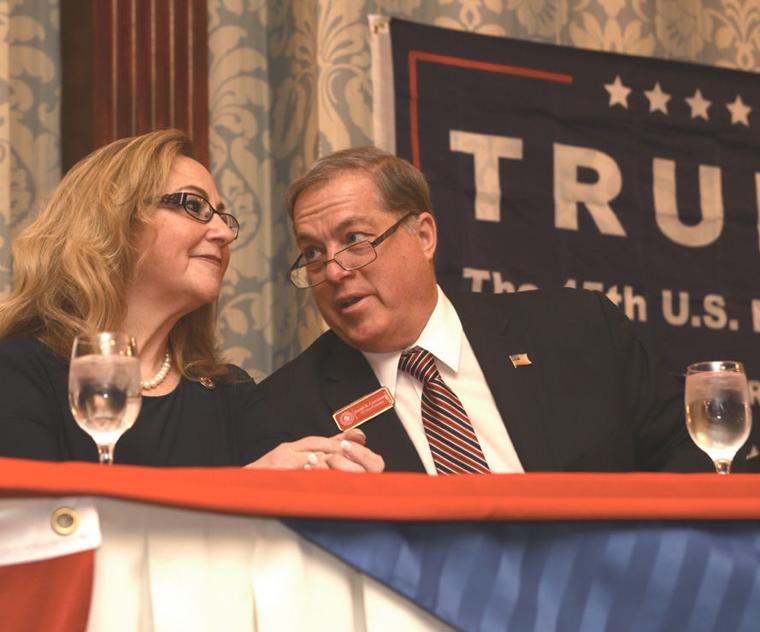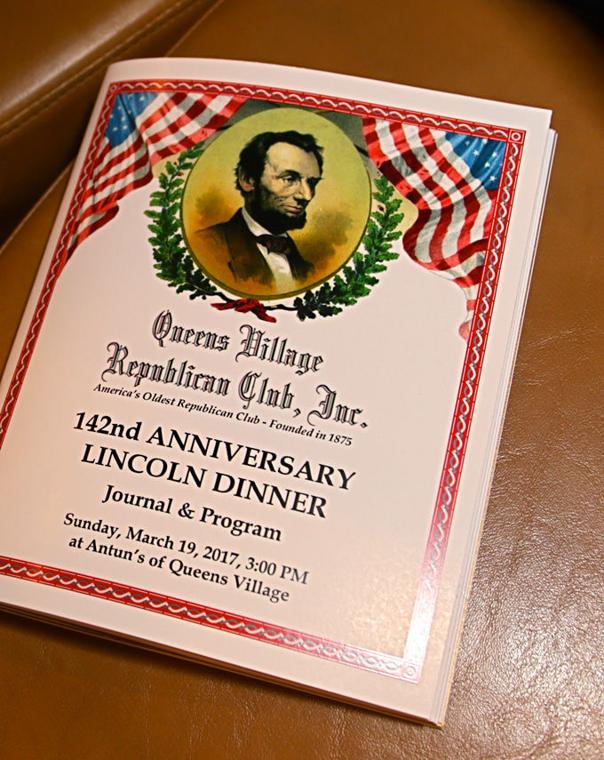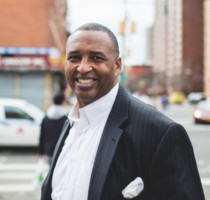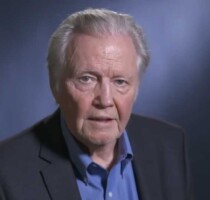
Conservative in Queens? A club for you
Article on Queens Village Republican Club as published in Queens Chronicle
Posted: Thursday, June 13, 2019 10:30 am |
by Michael Shain Editor

Joe Concannon, first vice president of the Queens Village Republican Club, chatted on the dais of the Lincoln Dinner, the group’s biggest event of the year, with Jamie Ulloa, an education activist.
Once upon a time, not that long ago, Republicans wandered the streets of Eastern Queens like wildebeest on the Serengeti.
As far as the eye could see, supporters of Dwight Eisenhower, Jacob Javits and Nelson Rockefeller lived, shopped and voted in the neighborhoods along the Nassau County border. Occasionally, they even won an election.
“This was a heavily Republican area,” said James Trent, the chairman and unofficial historian of the Queens Village Republican Club.
Back when New York City had a two-party political climate, the eastern half of Queens usually sent Republican lawmakers to the City Council and Albany.
The explanation was simple, said Trent. Queens Village is a neighborhood of single-family homes and, time was, “homeowners were traditionally more Republican than apartment dwellers.”
When the Queens Village Republican Club was founded in 1875, the name Queens Village didn’t even exist. The area was called Brushville.
The only thing that hasn’t changed since then is the name Republican and the turbulent style of party politics in Queens.
Just 20 years ago, the GOP club that claims to be the oldest in America came perilously close to going under altogther.
The story of its comeback is a variation on the Horatio Alger tale that Republicans so love to tell.
By the early 1990s, the Queens Village Republican Club was down to just four members, said Trent. Bill Clinton was president and there was widespread speculation that Republicans in a few short years would go the way of the Bull Moose Party.
“Between 1990 and ’94, it didn’t meet at all,” he said. “It never disbanded. It was just dormant.”
It was the Queens Village Catholic War Veterans in Bellerose that seemingly saved the group by hosting a QVGOP meeting at its headquarters and inviting all its members.
“About 70 people showed up and that was the beginning,” Trent said.
Shortly after, the Republican group discovered three other nearby clubs from Fresh Meadows, Bellaire and Bellerose that were experiencing the same thing.
“There’s nothing worse than going to meeting where six people show up,” said Trent. “It makes you feel like you’re on the fringe.”
The groups elected to merge with the QVGOP.
“Now,” he said, “we’re a serious club.”
Political clubs date back to the French Revolution. They are informal groups of like-minded people who gather to talk about the issues of the moment, usually with the goal of influencing elections or officeholders.
They are also natural breeding grounds for outsiders who want to seek public office.
In that way, they are like the tide pools of American politics, where ideas and political talent is spawned.
“We became a political club again when we started running people for office,” said Joe Concannon, a retired NYPD captain who is the club’s first vice president.
Concannon was among a handful of club members who have jumped into the election fray as candidates for the City Council and the state Assembly.
The club has yet to field a winning candidate but every time it runs someone, said Concannon, “it brings people to the club.”

The centerpiece of the QVGOP’s year is the annual Lincoln Dinner in early spring.
It not only is the group’s main fundraiser, but a showcase for conservative office seekers.
Assemblywoman Nicole Malliotakis (R-Staten Island, Brooklyn) kicked off her campaign for mayor there two years ago with a stemwinder speech outlining Bill de Blasio’s liberal shortcomings.
Before Bob Holden (D-Middle Village) challenged and upset incumbent Elizabeth Crowley in the City Council primary election of 2017, he spoke at the Lincoln Dinner about how his plan for reshaping city government to boost small businesses and middle-class homeowners and accepted an award.
Since the 2016 presidential election, the Lincoln Dinner has been a whistle stop for some of the Trump campaign’s most colorful personalities.
For figures like political consultant Roger Stone (who brought longtime friend Kristin Davis, the Manhattan Madam, as his date) and Trump’s campaign spokesman Corey Lewandowski, the dinner is a rare chance to appear before a sympathetic crowd inside the city limits of deep-blue New York.
Trent traces the origins of the Lincoln Dinner back 144 years, before the city was consolidated into five boroughs and Queens was included in what became Nassau County. What is now eastern Queens was largely farmland.
The dinner was the first thing the revitalized QVGOP club got going again.
“Sixty-one people came to the first dinner in 1995,” said Trent. “The last one, we had 350.”
While all this was happening, the ethnic makeup of Queens Village itself was changing, seemingly by the week.
Once a German, Irish and Italian neighborhood,it became home to large numbers of South Asian, Chinese, Hispanic and West Indian families.
The demographics did not look good for the QVGOP until, near the end of the 1990s a club calling itself the Haitian American Republican Coalition approached the QVGOP looking for a new home, said Trent.
“Many of them were doctors who had fled Haiti” and felt no affinity for Bill Clinton and the Democrats, he said.
“They wanted to be with the Republicans, and we embraced that,” said Trent.
“If you’re an immigrant, there’s this assumption you are on welfare and that you want freebies and handouts. You can’t get farther from the truth,” he said.
The QVGOP began seeking out more immigrant groups, one at a time.
Koreans were next, then Georgians (the once-Soviet kind) and Pakistani Christians.
“We started asking them, ‘We know how you feel about a lot of issues, so why are you Democrats?’” Trent recalled. “And they said: ‘Because they asked us. You didn’t.’”
Recruiting like-minded immigrants, he said, sets the Queens Village club apart from much of the rest of the party.
“A lot of people are not used to the way we do things here,” he said. “Where they come from, you criticize the government, you disappear.
“That’s why we have to reach out.
“I know people think Republicans are just a bunch of old white people. And maybe it’s that way in some parts of the country. But not in our club.”
The Rev. Tariq Rehmat, president of the United Pakastani-American Christian Community in Queens Village, was drawn to the club in 2016, he said, because it supported Trump, as he and his organization did.
“American values are not what is going on in New York right now,” he said. The people he met at his first QVGOP meeting were “totally different” than New Yorkers had known since immigrating here 20 years ago.
“I have brought a lot of Democrats to change registration to Republican,” Remat said proudly.
Concannon believes the QVGOP is “the most ethnically diverse Republican club in the state, maybe the United States.”




